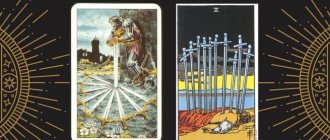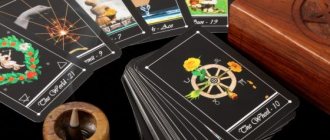"Save me, God!".
Thank you for visiting our website, before you start studying the information, please subscribe to our Orthodox community on Instagram, Lord, Save and Preserve † - https://www.instagram.com/spasi.gospodi/. The community has more than 60,000 subscribers. There are many of us like-minded people and we are growing quickly, we post prayers, sayings of saints, prayer requests, and timely post useful information about holidays and Orthodox events... Subscribe. Guardian Angel to you!
Surely there are quite a few people who like to play cards just for fun, when there is nothing else to do. Moreover, many Christians do this without even thinking about whether Orthodox Christians can play cards? At first glance, this is a harmless game that does not carry any negative consequences. But in reality this is far from the case. And in the Orthodox religion there are certain prohibitions on card games, even if you are not playing for profit. Moreover, this is considered a great sin, which should be taken into account in the list of sins before confession.
Maps and faith
First of all, why should Orthodox Christians not play cards? It is believed that a card game is excitement, which in turn gives rise to an inevitable dependence that acquires the appearance of sinfulness. Orthodox people should under no circumstances be attracted to cards and play various games with them. Since the demon pursues only one goal - to tempt all those who are closer to God.
Having played one game and lost, a person will want to play again and again until he wins. Even if you are already addicted, everyone can say that they can stop at any time. But actually it is not.
The best article for you, go to: Holy places in Israel for the Orthodox
In addition to excitement, the ban on spending time in card games has another interpretation, which carries a deeper meaning than excitement. The whole point is in the depiction of the suits themselves, which imply the image of the Cross of Christ along with other revered objects among Christians. These are items such as a spear, a sponge and nails. After all, it was they who became the instrument of execution, which brought incredible suffering to Jesus Christ.
O. Vladimir Vasilik. About “Yuletide fortune-telling” and cards / Orthodoxy.Ru
Christmastide—the time between Christmas and Epiphany—according to the spirit and meaning of the Church Charter, should be devoted to prayer and liturgy, rejoicing at the birth of Christ and waiting for His Epiphany.
On these days, marriages are not celebrated precisely because a believer must be at divine services every day.
Unfortunately, in pre-revolutionary Russia, in a non-church and unpious environment, Christmastide became a time of revelry, drunkenness, and gluttony. And also fortune telling.
K. Makovsky. Christmas fortune telling. 1890s Remember Zhukovsky in “Svetlana”?
Once on Epiphany evening the girls wondered
…
And also from Pushkin in Onegin:
Christmas time has arrived. What a joy! Windy youth wonders, For which nothing is sorry, Before which the distance of life Lies bright, boundless; Old age guesses through glasses At its gravestone, Having lost everything irrevocably; And all the same: hope for them
He lies with his baby talk
.
Important
Maybe unconsciously, but Alexander Sergeevich caught the main thing - the deceitful childishness of fortune telling. And the image of old age, having lost everything, but still wondering at its grave board, is reminiscent of a lost player at roulette, who bets the last gold on “zero”, and, of course, loses.
Why can't you guess? The question is childish and funny for a believer, but, alas, relevant for a half-believer or even a non-believer. Here's why. Many probably remember the story of M.A.
Bulgakov’s “Heart of a Dog” and the wonderful phrase of Professor Preobrazhensky: “Here, doctor, is what happens when a researcher, instead of going parallel and groping with nature, forces the question and lifts the veil: here, get Sharikov and eat him with porridge.”
It’s the same in the life of every person, when instead of going parallel and groping with God’s Providence (or for those who don’t understand this language, with his destiny), he lifts the veil over the future: then he receives his man-dog, his Anubis in the form of their distorted, mutilated fate - fulfilled fears and realized phantoms, or, on the contrary, the fragments of their unfulfilled hopes.
N.Ge. Saul at the Witch of Endor. 1857But for a believer everything is clear. Fortune tellers and questioners are worthy of the eighth circle of Dante’s Hell - the department of “violators of the Divine” (although, of course, the Divinity is not subject to any violence or pressure). These are people who want to snatch His secrets from God, to steal some secret knowledge from Him.
They again repeat the sin of Adam and Eve and heed the insidious whisper of the serpent: “And you will be like gods, knowing good and evil” (Gen. 3:5). But, naturally, God does not reveal anything to them, despite all their efforts. After all, “the wicked will not see the glory of God.” And Divine knowledge - even more so.
Then the question is - from whom do fortunetellers get their knowledge, if not from God? The answer is clear: from the monkey of God, that is, from the devil. Fortune tellers listen to the seducing spirits, the spirits of evil in heaven, and ultimately to their master, the Father of Lies, or, more simply, to the Chief Scammer, whose entire pleasure is to deceive, destroy, and kill.
It is no coincidence that many Church Fathers interpreted the well-known passage in the Bible (Gen. 6:1) about the union of the “sons of God” with the “daughters of men” in the context of the spiritual connection between female fortune tellers and demons who taught them fortune telling and witchcraft. And the harsh but justified Old Testament norm becomes clear: “Thou shalt not leave a sorcerer alive” (Ex. 22:18).
Advice
Because their profession is lying and communicating with demons. And the fate of the one who risks turning to them is clear - to become a demonic toy, an obedient ball in the hands of the Chief Thimblemaker and die.
The fate of the Israeli king Saul, who turned to the Endor fortune teller, is indicative: under the guise of Samuel, she summoned a demon who, apparently, correctly predicted the fate of Saul and his troops, but thereby demoralized them, morally disarmed them and did everything to ensure that his ominous dream came true and a destructive prophecy.
And not only in essence, but also in form, fortune telling carries anti-Christian meanings. Take, for example, cards as a tool for fortune telling. They are not so harmless in appearance.
Of all three hypotheses of the origin of cards (Chinese, Egyptian and European), the most convincing is the European-occult one, according to which cards appeared in Europe in the second half of the 14th century and are associated with the Jewish Kabbalistic environment[1]. In this case, everything falls into place.
It is no coincidence that the suit “cross” is also called the word “club”, while in the Jewish tradition, unclean food is called club food. Accordingly, the suit of “crosses,” blasphemously symbolizing the Cross of the Lord, is designated by a word testifying to the Jewish abomination of the Cross. The peaks symbolize the Spear of Longinus, which pierced the side of Christ (Jn.
19:34), which is hinted at by the very name of the “peak,” that is, a spear. “Worms” refers to the Gospel sponge on a reed: “one of the soldiers took a sponge, filled it with vinegar, and put it on the reed, gave Him to drink” (Matthew 27:48)[2]. Another interpretation is also connected with the Passion - this is the pierced heart of Christ. Finally, the “tambourines” symbolize the nails with which Christ was crucified[3].
It would seem, what do diamond-shaped “diamonds” have in common with nails? The answer is clear to those who have seen the heads of old pre-revolutionary nails: they are square, not round, like modern ones. Medieval nails were like that.
There is also a Jewish trace in the name “trump”, which is a corruption of the word “kosher”, which denotes “pure” food, ritually acceptable for Jews.
Let's look at the names of the cards. The most significant card is the joker (literally “jester”). But in the Italian version he is called “the devil” and originally on his staff he carried... a human head. The word "ace" is of Polish origin, from the Low German "devil". It is significant that on the ace card in the 16th century. They often drew... a pig - an animal, to put it mildly, not kosher from a Jewish point of view[4]. It is possible that the “lady” is a blasphemous image of the Madonna; the fact remains that biblical heroines - Rachel, Judith, and so on - were often depicted as ladies. Finally, David and Solomon were often depicted among the “kings.” In contrast, among the “jacks” (the word “jack” literally means “servant, serf”) was depicted the knight La Hire, nicknamed “Satan.”
It is no coincidence that cards soon began to be subject to bans and persecution due to their obvious connection with blasphemy and evil spirits. The occultists themselves recognize the occult nature of the so-called. tarot cards, or Egyptian cards, and the connection with them of ordinary cards. Here are just some eloquent quotes from occult sites:
“The history of the origin of playing cards is often considered together with the history of the Tarot (or Tarot) deck.
note
Tarot is a deck of 78 cards with various designs on them. The deck is divided into 2 parts, b o
The largest of which consists of 56 cards, called minor cards, and the other part - of 22 cards, called main (or major) cards, as well as Arcana.
The meaning of suits in Orthodoxy
As mentioned above, all four card suits carry a certain secret meaning:
- Cross means the cross on which Christ was crucified.
- The pikes are the pikes that were used to pierce his ribs.
- Diamonds mean nails.
- The worms symbolize a sponge with vinegar, which the torturers specifically gave to Christ instead of water.
For example, a player takes a card with the image of the Cross of Christ, which half the world worships, and throws it away, exclaiming “clubs.” Few people think about the fact that translated from Hebrew it means evil spirits, nasty. In the Bible, this word is interpreted as meat torn to pieces in the field, which cannot be eaten. It should be noted that each of the suits is mentioned in the holy scriptures and the Bible.
The unrepentant thief, who was crucified with Christ like a gambler, blasphemes the suffering of the Son of God, and without sincere repentance went to hell forever. The thief set an example for everyone and repented on the cross, thanks to which he inherited eternal life with God. Cards are demonic revelations, so under no circumstances should you keep them in the house and play or tell fortunes with them.
The best article for you, go to: Myrrh from the relics of St. Nicholas the Wonderworker
Primary meaning of pictures
Ancient Egyptian mythology depicted fire spirits as tambourines, worms as lords of the air, spirits of the water element as clubs, and black spades symbolized the underworld of the gnomes.
In medieval times, fortune telling cards began to represent human feelings; hearts meant love, clubs meant knowledge, diamonds symbolized money, and spades meant death.
Card games were filled with mystical meaning; amazing luck and sudden failures gave rise to unhealthy excitement, which temporarily affected the human psyche. Neither chess, checkers or dominoes had such a fascinating power to attract more and more new players.
In the 13th-14th centuries, human images appeared on cardboard sheets; as a gift to Charles the Fourth, the artist Gregonner took famous historical figures to depict the kings.
- King David became the king of the pike, a harp is drawn next to him, and Athena, the patroness of wisdom, is depicted as his lady.
- Club - Great Alexander the Great, Argina, the queen, appeared nearby.
- At the head of the tambourine, a symbol of wealth, was the famous Caesar with a lady - a heroine from the Bible, the beautiful Rachel.
- Charlemagne and Helen of Troy led the worms.
Playing cards 1658, France
Over time, various people, war heroes and public favorites have been depicted as prototypes of jacks, as lower ranks. Among the jacks there are pictures depicting Robin Hood, Lancelot, King Arthur and many others.
Important! Holding family portraits in his hands and manipulating them, the player is immersed in excitement and passion, which cannot be called Christian values.
Card symbols are used in the encryption of all computer games, which is perhaps why computer addiction arises, born of the same passion and excitement. History repeats itself on a more intellectual level, giving birth to new addictions that lead Christians away from worshiping the Lord.
Other games in Orthodoxy
There are several more common games, permission to play which is of interest to many believers. For example, a certain part of Christians do not know whether Orthodox Christians can play the lottery. There are cases when lottery winnings very often go not to the player for his own profit, but to charity. Despite this, many clergy are convinced that the lottery is also a game of chance. And therefore, playing it is also a sin.
As one priest said: “You shouldn’t gamble even if you really need money - as God wants, this is how it will happen in life.”
Reasons for this ban
Among the reasons why Orthodox Christians should not play cards are the following:
- loss of time stolen from family and communication with the Creator;
- inducement to unhealthy gambling;
- The original purpose of the deck is to tell fortunes and practice magic. These actions are not welcomed by the church;
- the symbols depicted on the cards blaspheme the history of Christianity.
According to the church, a Christian must lead a life filled with communication with the Creator and knowledge of his truths. This can be achieved if you diligently and thoughtfully read the Bible, know the prayer rules, and enjoy everything that the Lord has created. To love and do good throughout your earthly journey.
An important reason why Orthodox Christians should not play cards is that playing “pictures” have the power to stupefy the human mind. He is distracted from reality, he is overwhelmed with excitement, which is fraught with spiritual death. You can lose a lot this way:
- money;
- property;
- family;
- earthly life.
The result of such a rash act can be very sad. Just look at the cost of gambling debts, for which people can be deprived of their lives. Card games are widely popular among criminals. This fact also proves what category of people engage in such entertainment. Spiritually devastated people find joy in intoxicating excitement. And they often pay too high a price for it.
Is it possible for Orthodox Christians to play computer games?
Despite the fact that today there are quite a large number of different computer games, with different goals and tasks they are considered gambling and do not bring any benefit to a person. Therefore, playing such games according to the Orthodox religion is also a sin. Moreover, such games carry a fairly serious threat of not only psychological illness, but sometimes even death.
The best article for you, go to: What is the grace of God and how does it work
The Lord is always with you!
Advice from priests
Believers can spend time usefully, without betraying Christian truths. You can enjoy communication with the Creator in the process of prayer endlessly.
And this is not difficult to achieve with such godly actions:
- prayers;
- visiting a temple;
- making pilgrimage trips to Holy places;
- attending Sunday Christian school;
- you can sing and draw;
- one should engage in charitable works, helping orphans and the elderly;
- you need to pay more attention to your family members.
There is so much of the Lord's beauty in Orthodox life that one can enjoy it endlessly. Therefore, the tares that Satan sows must be carefully cleansed and removed from the life of a Christian.
Playing cards: history, vice, sin
Playing cards have quite a long history, and there are several versions of their origin.
One of the common versions is called “Turkic”: at the turn of the 12th - 13th centuries AD. The military class of medieval Egyptians - the Mamluks - played with a deck of 52 cards with values from 1 to 10, which had four suits (swords, clubs, cups and coins).
The picture below shows an incomplete Mamluk card deck in hierarchy order, each subsequent “beats” the previous one.
Mamluk maps. From left to right: ten of cups, three of cups, first advisor of cups, second advisor of cups
Another version says that playing cards appeared in 1120 in China, and just a decade later they gained great popularity.
Today, we can say for sure that modern Chinese playing cards originate from Chinese paper money (the era of the Tang Dynasty), which have hand-drawn symbols of their denomination.
The drawings on the cards indicate the suits of the Chinese card deck, and subsequently in Europe served as the source of the appearance of the suits of denarii, clubs, swords and cups.
Ancient playing cards of China
And another version says that playing cards appeared in Persia and came to India, but if card games did not gain popularity among the Persians, then in India everything is different.
Indian pictures of playing cards depicted a four-armed Shiva, who held a cup, a sword, a coin and a staff in his hands, and the deck had its own name - ganjifa.
Indian playing cards - Ganjifa
What do the holy fathers say about fortune telling?
St. Ephraim the Syrian: “Beware of making potions, casting spells, telling fortunes, making storages (talismans) or wearing those made by others: these are not storages, but bonds.”
St. John Chrysostom: “Just as slave traders, offering small children pies, sweet fruits and the like, often catch them with such bait and deprive them of freedom and even life itself, so in the same way sorcerers, promising to cure a disease, deprive a person of the salvation of his soul.”
Saint Basil the Great: “Do not be curious about the future, but make good use of the present. For what benefit is there for you to anticipate the command? If the future brings you something good, it will come, although you did not know it in advance. And if it is sorrowful, why languish in sorrow until the end? Do you want to make sure of the future? Fulfill what is prescribed by the Gospel Law and expect to enjoy blessings.”
Let's sum it up
Card games are an activity that is prohibited by the Christian Church. Therefore, he should have no place in an Orthodox family. Having studied the history of the appearance of the first decks, you can see that they were created for gambling. And unhealthy passion can lead a person to big losses. Because of this, they can even take a life when a player has a large gambling debt. This is widely practiced in the criminal world.
The priests claim that the mission of the cards is to deliberately humiliate the image of Christ. Analysis of the card suits suggests that they were created in the image of those means that were used to torture the Son of the Lord. There were times when card games were banned by kings.
You can spend your time much more excitingly if you indulge in prayers and discussion of divine truths. It is not forbidden to draw and sing. Helping those in need is also very welcome: the elderly, the sick, orphans.
It is important to devote as much time as possible to your family and loved ones. And enjoy every new day. Among the divine gifts there is no place for unholy activities. It is believed that a deck of cards does not even need to be kept in the house. And people who engage in fortune telling commit a great sin. They will be deprived of the joy of eternal life.
Christians must take care of their souls. Therefore, when choosing activities, you should be careful and analyze your actions. And always give preference to godly activities.
Information site about icons, prayers, Orthodox traditions.
"Save me, God!". Thank you for visiting our website, before you start studying the information, please subscribe to our Orthodox community on Instagram, Lord, Save and Preserve † – https://www.instagram.com/spasi.gospodi/. The community has more than 44,000 subscribers.
There are many of us like-minded people and we are growing quickly, we post prayers, sayings of saints, prayer requests, and timely post useful information about holidays and Orthodox events. Subscribe. Guardian Angel to you!
Surely there are quite a few people who like to play cards just for fun, when there is nothing else to do. Moreover, many Christians do this without even thinking about whether Orthodox Christians can play cards? At first glance, this is a harmless game that does not carry any negative consequences. But in reality this is far from the case. And in the Orthodox religion there are certain prohibitions on card games, even if you are not playing for profit. Moreover, this is considered a great sin, which should be taken into account in the list of sins before confession.










